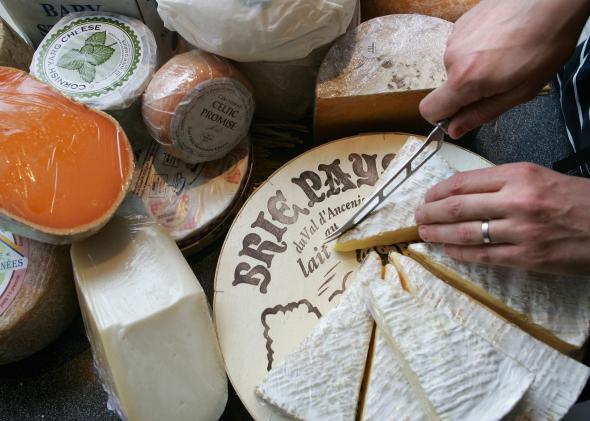NPR’s Latoya Dennis has a report out this week about European attempts to compel America to “get its own cheese names.” Europe takes cheese names very, very seriously. The EU affords “protected designation of origin” (PDO) status to 180 cheeses, from Allgäuer Bergkäse to West Country Farmhouse Cheddar. The PDO label is a type of geographical indication that means that a cheese was made in a specific region according to traditional methods—similar products made in other regions must use another name or risk getting sued.
Now, as part of the Transatlantic Trade and Investment Partnership currently under negotiation between the U.S. and the EU, the European Parliament wants America to adopt some of those PDO standards—which means that Kraft Parmesan cheese in a can will need a new name. (In Italy, the salty dairy powder is known as “pamesello.”) In the European Parliament’s view, “the Agreement should guarantee respect for the European Union’s standards and values. This is why the negotiations should … make provision for the strong protection of intellectual property rights, including geographical indications.” (The EU has been fighting this uphill battle for a while.)
Dennis interviewed a U.S. cheese-maker who’s unhappy with the proposed agreement. “People have spent a great deal of money on labeling, building traditions, building a name on a product,” Steve Stettler told Dennis. (By “people,” he means “American cheese-makers.”) “And then not being able to use that name would be kind of horrific.”
I am sympathetic to the argument that the EU restriction would make life difficult for American cheese-makers, and god knows it’s hard enough for agricultural producers to make a living already. But the EU is right. American cheeses should get their own names.
That’s because some unscrupulous American cheese producers exploit public ignorance and lax labeling laws to mislead consumers. Take Brie, for instance. As my colleague Forrest Wickman explained last fall, the cheese sold as Brie in the United States bears little resemblance to the Bries protected by the EU. French Brie de Meaux and Brie de Melun are made with raw milk, and unaged raw milk cheese is illegal in the U.S. (which is a dumb law). That means that U.S. “bries” (even the ones deceptively labeled “Brie de Meaux”!) are pasteurized and therefore much firmer and blander than French brie. Most casual cheese lovers don’t know minutiae like this, and they buy Brie thinking that they’re getting a decent French cheese. For the sake of transparency and honesty, American cheese-makers shouldn’t be allowed to capitalize on traditional European cheese’s good name.
But forcing American cheese-makers to come up with new names wouldn’t just be good for European importers—it would be good for American cheese-makers, too. Back in the ’70s, when Brie and other European cheeses began gaining popularity in the States, Americans worshipped at the altar of European (especially French) cuisine. With Julia Child and James Beard as their guides, New World foodies put Old World ingredients and techniques on a pedestal. These days, European ingredients are passé—now, American foodies are interested in American terroir, local produce, and small-batch artisans. If cheese-makers name their cheese something that highlights its local provenance and American characteristics—if they can talk about the animals that made the milk and the techniques that turned it into cheese—food enthusiasts will eat it up.
So if they can’t call those orange-rimmed squares Muenster anymore, what should American producers call it? To get the ball rolling, I put several European cheese names into Slate’s Adele Dazeem Name Generator, which mangles names the way John Travolta mangled Idina Menzel’s at the Oscars. The Travoltified version of Brie is “Blake.” Provolone is “Preston.” Gouda is “Georgia.” Parmigiano-Reggiano is “Patrick Ridgardser.” These are all fine names for cheeses. Or, lest elementary school bullies start taunting all the little Blakes out there for sharing a name with a bloomy-rind cheese, cheese-makers could go even crazier with their names. Many independent cheese-makers have already staked out unique monikers for their unique wares. At the cheese bar around the corner from Slate’s New York office, for instance, they serve a Siltcoos, a goat cheese named after a lake in Oregon, and a Hooligan, an award-winning pungent washed-rind cow’s cheese from Connecticut. When you order a Siltcoos or a Hooligan, you know exactly what you’re getting—and you know it was made in the U.S. of A.
